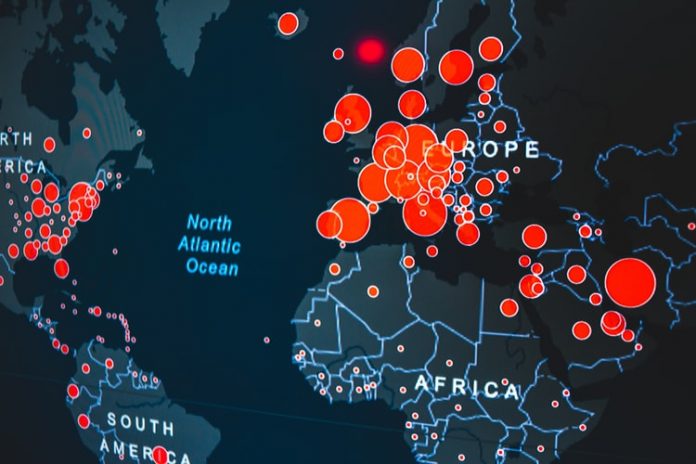This article is written by Saransh Chaturvedi, a student from Rajiv Gandhi School of Intellectual Property Law, Indian Institute of Technology, Kharagpur. In this article, he explains the impact of pandemic of COVID-19 on International Law.
Table of Contents
Introduction
COVID-19, perhaps, can be said to be the biggest outbreak of the 21st century. This disease, not only has changed the lifestyle of the world, but also drastically reversed the mention, thereby affecting economy finance, investment, trade among other countries. COVID-19, believes to be originated from Wuhan, has spread throughout the world. It is not that the world has not faced any kind of such outbreak before. But, any of the previous diseases didn’t overwhelm medical system, the opposite of which we are seeing in the case of novel coronavirus. This outbreak has even shattered those countries, where the healthcare facilities were considered to be the best in the world. In this article, I will discuss the implication of COVID-19 over International law and how does it matters in the present situation.
Pandemic or Epidemic?
One of the foremost criticism of WHO has been its lately decision on declaring this outbreak as Pandemic. What constitutes difference between Pandemic, epidemic and a mere outbreak? The term outbreak can be relied on to a situation where a disease infects a lot of people within a smaller area in a short period of time. For e.g. Measles in the US over the past years. This disease often is controlled by the vaccination or other medical care. Talking about Epidemic as defined by WHO, as the occurrence in a community or region of cases of an illness, clearly above normal expectancy. Through this definition, COVID- 19 can be termed as an Epidemic in China, South Korea, Italy etc., where it was, first diagnosed. ‘Pandemic’ is much scarier, as that disease which is occurring worldwide and crossing international boundaries. Even when this disease has reached more than 80 countries, WHO was adamant on not terming it as Pandemic. On 11th March, 2020 WHO declared Covid-19 as pandemic when the number of cases outside China increased 13- fold and number of countries with cases increased threefold. Indeed, there was a delay on the part of WHO, to declare it as Pandemic.

Obligation to Other States
This is one of the most important aspect of International Law that must be met towards other states. If there is any sort of public health emergency, under the International Law, state being the subject of international law, is duty-bound to provide timely and sufficiently detailed information to the world at large. This has also been stated under Article 6 of International Health Regulations, where WHO mandates to provide for information of any of such health emergencies that can have serious implications over the world healthcare
Before going further on the obligation towards other states, let us first get a brief analysis of what is International Health Regulation (hereinafter, IHR). IHR is a legally binding instrument of international law which was entered in 2007. As mentioned, on the WHO website, its purpose is to prevent, protect against, control and provide a public health response to international spread of disease in ways that are commensurate with and restricted to public health risks and which avoid unnecessary interference with international traffic and trade.
This issue is very necessary in terms of combating the spread of disease. The detailed information about the disease can be very useful in combating the spread and thereby, saving lives of millions of people. Not sharing the information can also have serious implications over the state. If we go through the Draft Article on Responsibility of States for Internationally Wrongful Act, Article 2 of which clearly states that there is an internationally wrongful act of a state when conduct consisting of an action or omission is attributable to the State under international law and it constitute a breach of an international obligation of State. Regarding the clause of constituting a breach of an international obligation, we refer back to IHR. In IHR, if we read Article 6 (already discussed above) which provide for time-bound detailed information and Article 10, which mandates WHO to seek verification from States of unofficial reports of pathogenic microorganisms, under which States are bound to provide this information. Hence if any State, by their act constitutes a breach of international obligation, they can be held liable under the abovementioned laws.
Will China be held liable?
Well, the whole world is now blaming China for the cause. Prima facie, it can be easily concluded that China, was indeed wrong at many fronts. China, did breach the IHR by intentionally withholding critical information about this virus. Also, China rejected the WHO’s offer of epidemic investigative assistance despite pressure from the global community. It was China’s withholding of critical information, that made WHO believe that human to human transmission of this deadly disease was not possible.
Leaving the question of China being liable or not, to ICJ, we should move onto the most important principle of international law in this area, i.e. No Harm Principle and Due Diligence.

No Harm Principle and Due Diligence
In the law of torts, the concept of vicarious liability as well as strict liability has been widely studied and discussed. More or less, the similar principle is being applied here when we talk of No Harm and Due Diligence Principles. The No Harm Principle was well established in the case of Albama Trail Smelter, Nuclear Weapons Case. International Law Commission work on the making the 2001 Draft Article on Prevention of Transboundary Harm makes our job, of understanding the law, easier. Article 2 of the Draft Article, read with the Commentary specified, requires the State to prevent, stop and redress significant transboundary harm to other states, which are originating under that States, which are originating under that State jurisdiction. Also a general reading of the general commentary, it requires the State to at least work to minimize the risk. Moving further to Article 3 and 4 it talks about the types of duties which the State must carry such as, monitoring, supervision, assessment, legislation, administrative policies, regulation, enforcement.
Due Diligence, comes during the assessment of the State’s conduct. As the name suggest the meaning, it is the assessment of the State’s conduct over a harm. As per the No Harm Principle, it is the State which has to work to minimize the risk and as per the Due Diligence, it has to be seen that State’s conduct was reasonably expected of it while responding to harm or danger. These standards are not defined anywhere but these are in-built in a series of rules of conventional and customary international law applying generally to inter-state relations. This due-diligence is often in a flexible standard, varying according to State capabilities and also to severity of the situation.
Assuming without admitting, that China is responsible for this pandemic. For it to be responsible for the same, it has to be proved under the No harm principle, whether it did sufficient duty to at least prevent the harm, the answer to which is “No” on the first stage. China was unable to prevent its harm or at least work to minimize it, so that it does not crosses the boundary of China. No question of due- diligence comes, when even the first principle is not followed. Countries can be held liable for activities that happen within their national boundaries but impact other countries, (Gabcikovo- Nagymaros).
Conclusion and Impact on Other Sectors
COVID-19 has nearly affected all the sectors of economy be it education, stock market, oil, civil aviation or any other. Nearly all the sectors are seeing one or the other type of constraint. Even there is constraint on entry to a country due to closure of border and it may certainly be a violation of one or the other obligatory convention but on the other side these all actions are totally justified being under the exemption clause of the specified treaty. This hard time requires patience, perseverance and co-operation among the member of states so that we can get out of this time and international law can thrive once again.
LawSikho has created a telegram group for exchanging legal knowledge, referrals and various opportunities. You can click on this link and join:
https://t.me/joinchat/J_0YrBa4IBSHdpuTfQO_sA
Follow us on Instagram and subscribe to our YouTube channel for more amazing legal content.
 Serato DJ Crack 2025Serato DJ PRO Crack
Serato DJ Crack 2025Serato DJ PRO Crack










 Allow notifications
Allow notifications


